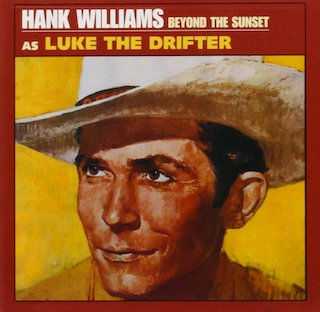"Ramblin' Man" is a song written in 1951 by Hank Williams. It was released as the B-side to the 1953 number one hit "Take These Chains from My Heart", as well as to the 1976 re-release of "Why Don't You Love Me". It is also included on the 40 Greatest Hits, a staple of his CD re-released material.
"Men with Broken Hearts" is a song written and recorded by Hank Williams under the pseudonym "Luke the Drifter." It was released on MGM Records in 1951.
"Rootie Tootie" is a novelty song written by Fred Rose and recorded by Hank Williams on MGM Records in 1948.
"I've Just Told Mama Goodbye" is a song by Hank Williams on MGM Records.
"Why Should We Try Anymore" is a song written by Hank Williams and released as a single on MGM Records in 1950.
"Dear John" is a song written by Tex Ritter and Aubrey Gass. It is best remembered for being the A-side to Hank Williams' number one hit "Cold, Cold Heart" in 1951 for MGM Records.
"I Won't Be Home No More" is a song recorded by Hank Williams on July 11, 1952. It was released posthumously on MGM Records a year later in July 1953. The song climbed to No. 4 on the US Billboard National Best Sellers chart.
"Crazy Heart" is a song by Hank Williams. It was written by Fred Rose and Maurice Murray and reached number four in the record chart for Williams in 1951. It was recorded at Castle Studio in Nashville on July 25, 1951 with Fred Rose producing and backing from Don Helms, Jerry Rivers (fiddle), Sammy Pruett, Howard Watts (bass) and probably Jack Shook.
"Baby, We're Really in Love" is a song written and recorded by Hank Williams and released on MGM Records. It peaked at number four on the Billboard country singles chart. It was recorded at Castle Studio in Nashville on July 25, 1951 with Fred Rose producing and backing from Don Helms, Jerry Rivers (fiddle), Sammy Pruett, Howard Watts (bass) and probably Jack Shook. It was his fourteenth Top 5 hit.
"I'd Still Want You" is a song written and recorded by Hank Williams and released on MGM Records. It was selected to be the B-side to the up-tempo "Baby, We're Really in Love." Williams biographer Colin Escott calls it "another bleak commentary on Hank's continuing need for Audrey [Williams, his wife] as she closed off her heart to him." It was recorded at Castle Studio in Nashville on July 25, 1951 with Fred Rose producing and backing from Don Helms, Jerry Rivers (fiddle), Sammy Pruett, Howard Watts (bass) and probably Jack Shook.
"Let's Turn Back the Years" is a song written and originally recorded by Hank Williams for MGM Records.
"Weary Blues from Waitin'" is a song written by Hank Williams. It was released as a posthumous single on MGM Records in 1953.
"I Can't Escape from You" is a song written by Hank Williams. The song was originally recorded as a demo by Williams probably in 1951 but he never recorded it in a studio with a band. MGM released an overdubbed version in 1953 with backing from the Drifting Cowboys. The song contains the bitter testimony of a man haunted by the memory of a woman who has "a heart of stone." Like many of the demos that feature just Williams and his guitar, the original performance is artlessly affecting and displays his spare, haunting lyrics:

Hank Williams as Luke the Drifter is an LP by Hank Williams released by MGM Records in 1953. It features narrations that Williams released under the pseudonym Luke the Drifter.
Pictures from Life's Other Side" is a traditional song popularized by Hank Williams under the pseudonym "Luke the Drifter." It was released on MGM Records in 1951.
"Beyond the Sunset" is a song written by Blanche Kerr Brock, Virgil P. Brock, and Albert Kennedy Rowswell. It was released as a single by Hank Williams under the pseudonym Luke the Drifter in 1950.
"Help Me Understand" is a song written by Hank Williams and released under the name "Luke the Drifter" on MGM Records in 1950.
"No, No, Joe" is a song by Hank Williams. It was written by Fred Rose and takes aim at Soviet leader Joseph Stalin.
"I've Been Down That Road Before" is a talking blues song by Hank Williams. It was released by MGM Records under the name "Luke the Drifter", which was a pseudonym for Hank's recitations. It was another dose of the sage advice that Luke the Drifter seemed endlessly capable of dispensing - and Hank Williams seemed just as capable of ignoring. Biographer Colin Escott calls it "perhaps the most directly biographical song he ever wrote, and leaves us guessing at the incidents that inspired it." He recorded it in Nashville on June 1, 1951 with Fred Rose producing and backing by Jerry Rivers (fiddle), Don Helms, Sammy Pruett, Jack Shook, Ernie Newton or "Cedric Rainwater", aka Howard Watts (bass), and possibly Owen Bradley (organ).
"Be Careful of Stones that You Throw" is a song recorded by Hank Williams. It was written by Bonnie Dodd.

